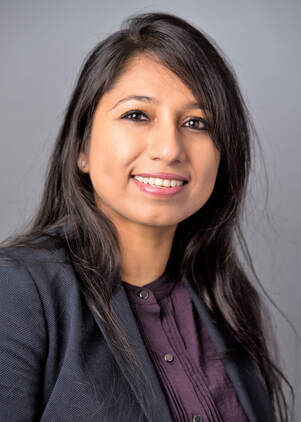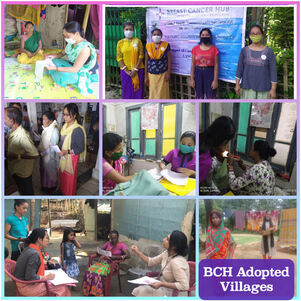 Interview and words by Rinki Saha Edited by Laurie Herviou and Lucie Yammine ‘Success is a journey, not a destination’ – Meet Dr. Lopamudra Das Roy who started her career as a cancer research scientist, later diverted her path, and founded a non-profit organization called Breast Cancer Hub (BCH). She gave a motivating interview to INetNYC about her novel cause of breast cancer awareness. Her story is a perfect example of how the journey can change the destination and how you can leave everything behind to devote your life to cancer patients. Let’s hear about her incredibly fascinating journey. Lopamudra, can you tell us about your background? I was born in Assam, the North-Eastern part of India. Since my childhood, I was always inspired by my father who was an eminent pediatrician and I wanted to achieve a career in the field of healthcare. I earned my Ph.D. in Genetics from Assam University, India in 2007. Later I did a Postdoctoral Fellowship in cancer immunology & metastasis focusing on breast & pancreatic cancer at the Mayo Clinic College of Medicine. After this training, I joined the University of North Carolina at Charlotte (UNCC) as a Cancer Scientist and Research Professor. I was awarded grants as Principal Investigator from the Department of Defense cancer research program & National Cancer Institute to investigate targeted therapies and signaling pathways in metastatic breast and pancreatic cancer. I also received my MBA from Northwestern University – Kellogg School of Management. In brief, my scientific career was more than a decade in the making and I was later working as an adjunct Associate Professor at UNCC and Research Director at OncoTab, Inc; Cancer Diagnostics & Therapeutics, a UNCC spin-off. What motivated you to create this non-profit organization? Over the years I witnessed the real-time suffering of cancer patients and how breast cancer can ruin one family in just a few months if not detected early. I realized that there is a huge lack of awareness regarding breast cancer even here in the US and I already knew the situation in India where nobody wanted to talk about breast cancer and there was a huge taboo behind it. In my mind, I could already imagine long-term sustainable plans which can bridge this awareness gap and help millions of cancer patients lives and their family. During my time at Kellogg, I pitched my long-term dream project of how to merge breast cancer awareness in the developing and developed world. The idea was well appreciated and also, I got some kind of confirmation that this plan could materialize. Finally, in 2017 I decided to change the direction of my science career and invest all my effort and time to serve as a volunteer for the awareness program for breast cancer and formed a non-profit organization named Breast Cancer Hub. My decision to leave my research and start this foundation was because I knew from the beginning that it’s going to be a full-time involvement and I would never be able to devote my entire effort if I have continued in my scientist position. To start with, I did an online survey to see how awareness stands in both developed and developing countries. The survey was an eye-opener and indicated that irrespective of socio-economic conditions & education, women are reluctant to take breast health seriously. The survey also revealed that people are not at all aware of many crucial facts about breast cancer, such as
Worldwide lot of women are not going for breast cancer screening even after 40 years of age as there is a misconception that it can only be genetic, so they do not have to worry if it doesn’t run in their family. This survey helped me build the statistics of the current awareness status and provided me the rock-solid thought process to proceed to the next steps. The overarching mission of this organization is to organize health care programs, sustainable goals of helping cancer patients across developed and developing countries.  How can a mammogram miss the existence of Breast Cancer? Because some of the women have very dense breast tissue made up of fibro glandular tissue, the current mammogram resolution makes it difficult to pick up the cancer cells. For those women, breast ultrasound and other additional tests can help detect cancer. Because of this misdiagnosis, many patients remain untreated. You can read more about this issue here. Would you please elaborate on this village adoption program? We adopted villages to penetrate deeper, going to each member, each household, maintaining database & follow-ups, for cancer screening, treatment, management, palliative care & epidemiological research study. We take accountability for each patient. During that process, if we find someone who is suffering, we immediately take the suspected cases to the local cancer hospital for further diagnosis, treatment, and provide end to end support. We focus on breast, oral (anti-tobacco campaign), cervical as well as other types of cancers. We provide them with all the economic and mental support. You can read more about village adoption here. I am also very glad to say that many organizations in India, Indonesia, and Africa are now reaching out to us for collaboration or guidance to replicate this village adoption model for their community work. Join Us in two weeks to hear more from Dr. Lopamudra Das Roy about how BCH organizes its awareness program across the world. H H
0 Comments
Your comment will be posted after it is approved.
Leave a Reply. |
Archives
May 2025
Categories
All
|
 RSS Feed
RSS Feed